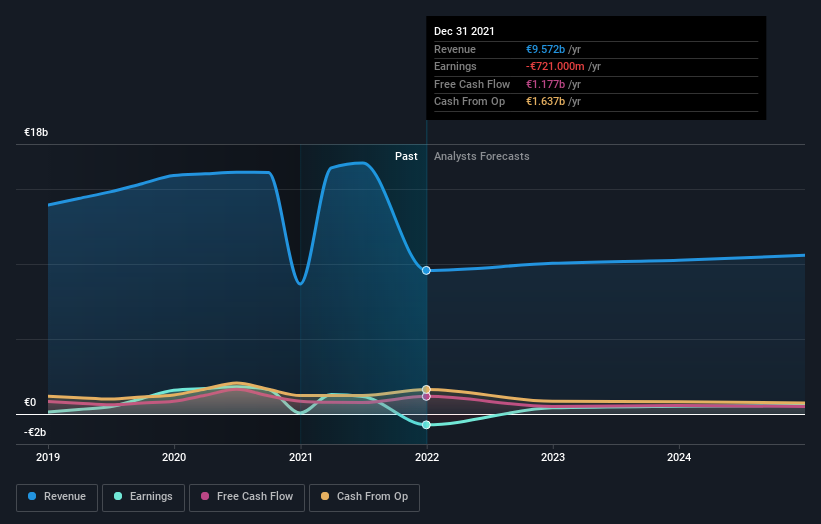
While Vivendi SE (EPA:VIV) might not be the most widely known stock at the moment, it received a lot of attention from a substantial price movement on the ENXTPA over the last few months, increasing to €12.10 at one point, and dropping to the lows of €9.26. Some share price movements can give investors a better opportunity to enter into the stock, and potentially buy at a lower price. A question to answer is whether Vivendi's current trading price of €9.45 reflective of the actual value of the mid-cap? Or is it currently undervalued, providing us with the opportunity to buy? Let’s take a look at Vivendi’s outlook and value based on the most recent financial data to see if there are any catalysts for a price change.
Check out our latest analysis for Vivendi
What's the opportunity in Vivendi?
The stock is currently trading at €9.45 on the share market, which means it is overvalued by 31% compared to my intrinsic value of €7.24. This means that the buying opportunity has probably disappeared for now. In addition to this, it seems like Vivendi’s share price is quite stable, which could mean two things: firstly, it may take the share price a while to fall back down to an attractive buying range, and secondly, there may be less chances to buy low in the future once it reaches that value. This is because the stock is less volatile than the wider market given its low beta.
What does the future of Vivendi look like?

Future outlook is an important aspect when you’re looking at buying a stock, especially if you are an investor looking for growth in your portfolio. Buying a great company with a robust outlook at a cheap price is always a good investment, so let’s also take a look at the company's future expectations. Vivendi's revenue growth are expected to be in the teens in the upcoming years, indicating a solid future ahead. Unless expenses grow at the same level, or higher, this top-line growth should lead to robust cash flows, feeding into a higher share value.
What this means for you:
Are you a shareholder? It seems like the market has well and truly priced in VIV’s positive outlook, with shares trading above its fair value. At this current price, shareholders may be asking a different question – should I sell? If you believe VIV should trade below its current price, selling high and buying it back up again when its price falls towards its real value can be profitable. But before you make this decision, take a look at whether its fundamentals have changed.
Are you a potential investor? If you’ve been keeping tabs on VIV for some time, now may not be the best time to enter into the stock. The price has surpassed its true value, which means there’s no upside from mispricing. However, the positive outlook is encouraging for VIV, which means it’s worth diving deeper into other factors in order to take advantage of the next price drop.
If you'd like to know more about Vivendi as a business, it's important to be aware of any risks it's facing. At Simply Wall St, we found 1 warning sign for Vivendi and we think they deserve your attention.
If you are no longer interested in Vivendi, you can use our free platform to see our list of over 50 other stocks with a high growth potential.
New: Manage All Your Stock Portfolios in One Place
We've created the ultimate portfolio companion for stock investors, and it's free.
• Connect an unlimited number of Portfolios and see your total in one currency
• Be alerted to new Warning Signs or Risks via email or mobile
• Track the Fair Value of your stocks
Have feedback on this article? Concerned about the content? Get in touch with us directly. Alternatively, email editorial-team (at) simplywallst.com.
This article by Simply Wall St is general in nature. We provide commentary based on historical data and analyst forecasts only using an unbiased methodology and our articles are not intended to be financial advice. It does not constitute a recommendation to buy or sell any stock, and does not take account of your objectives, or your financial situation. We aim to bring you long-term focused analysis driven by fundamental data. Note that our analysis may not factor in the latest price-sensitive company announcements or qualitative material. Simply Wall St has no position in any stocks mentioned.
About ENXTPA:VIV
Vivendi
Operates as an entertainment, media, and communication company in France, the rest of Europe, the Americas, Asia/Oceania, and Africa.
Excellent balance sheet average dividend payer.
Similar Companies
Market Insights
Community Narratives




